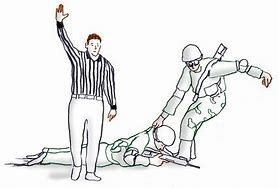The Idea of “Just” War
Christians have long held that most wars are immoral and unjustifiable, but that some wars are morally acceptable, legitimate or “just.” The following must be true for a war to be just:
• The cause must be just. Aggression, revenge, economic gain or the taking of territory are not legitimate causes for war.
◦  Defending your nation against a aggressor is just.
Defending your nation against a aggressor is just.
◦ Defending innocent citizens is a just cause.
◦ Defending a weaker nation assaulted unjustly by a stronger nation is a just cause.
◦ Retaliating against intermittent forms of aggression (such as terrorism) is a just cause.
• War must be the last resort. All other solutions to the hostilities must be tried first. Only when negotiations and compromise have failed is war permissible.
• War must be formally declared by legitimate governmental authority. War is not the prerogative of individuals but of governments.
• War must have limited objectives. One side should not attempt to thoroughly annihilate the other side, and even the aggressor should have his territory restored in defeat. 
• Warfare must employ only necessary force. Weapons and tactics must fit the context and use only what is needed to repel aggression and secure peace. Torture, chemical warfare, human shields, and scorched earth policies are not just forms of warfare.
• Noncombatants should normally be immune from war. Civilians, POWs, medical workers and other noncombatants should not be targeted. However, the industries that drive a country’s war-making capacity (e.g., transport, oil, communications, etc.) are legitimate targets.
• Reasonable prospect for victory (Lk 14:31-32). If one cannot win a war, undertaking it is a mass suicide. Of course, where the aggressor is evil, a fight to the death is better than torture or slavery.
• If an attack is imminent and certain, a preemptive strike may be justified as the best way to defend yourself.
Values and War
• Peace is normally preferable to war. But peace is not the highest moral value. There are times that one must sacrifice peace in order to assure higher values like freedom from oppression and defense of one’s own country.
• When nations or large groups are threatened or oppressed, war may be the means of providing relief for the suffering.
• Personal hope and inner peace should not stem from the freedom of conflict. One’s hope should be in God, not in any governmental powers.
• Except in the case of the Rapture, all people will eventually die. Only the time and manner of death are in question. The saving or extending of human life is not the ultimate value in the world. Some things are worth dying for.
Nuclear War
The world has been under the threat of nuclear war since 1945, when nuclear weapons were used in WWII to destroy Hiroshima and Nagasaki in Japan. After WWII, during the “cold” war, the number and destructive capacity of nuclear weapons increased dramatically. Today, if the nuclear arsenals of several countries was employed, it is possible that all human life on the planet would be wiped out. 
For example, a nuclear exchange between the US, China, Russia, and Europe could destroy most if not all human life.
Given these realities, some have suggested that any use of nuclear arms would be immoral because such a war would likely escalate, with the possibility of destroying all human life becoming greater and greater. To avoid such a scenario altogether, nations should agree to control, limit, and eventually destroy all nuclear weapons.
However, given the fact that “nukes” exist, it is wise for civilized governments to have them on hand in order to prevent hostile nations from attempting invasions. Mutually assured destruction, the fact that in a nuclear war both sides would be destroyed, helped keep the peace during the cold war. If responsible nations destroy their nuclear capacities, it is likely that “rogue” states will use nuclear technology to threaten or even destroy their enemies. So it’s wise for the leading nations of the world to maintain at least a minimum nuclear arsenal. If they are outlawed, then outlawed nations will be the only ones with them. If nuclear weapons are ruled unjust, then the unjust will rule.
Adapted from Brad Anderson & Norm Geisler
 – David De Bruyn, Professor of Church History, Shepherds’ Seminary Africa
– David De Bruyn, Professor of Church History, Shepherds’ Seminary Africa

